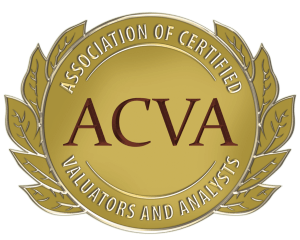Certified Valuation Analyst (CVA)
Benefits of CVA

Navigate the comprehensive process of business valuation with precision, encompassing every crucial step from initiation to conclusion.

Select a fitting valuation method from a range of approaches, aligning with the designated purpose and standard of value for each unique valuation assignment.

Perform a meticulous financial analysis tailored to the subject company, ensuring relevance and appropriateness for the specific nuances of the valuation engagement.

Discern the foundational elements of the business valuation analysis, illuminating the key value drivers that underpin the assessed value of a subject company.

Demonstrate proficiency in distinguishing between diverse standards of value for businesses, and adeptly apply their nuanced intricacies in the context of a business valuation engagement.

Participants develop professionally strong communication skills necessary for effectively conveying complex valuation concepts and findings to clients, stakeholders, and other relevant parties, facilitating clearer understanding and informed decision-making throughout the valuation process.
CVA Handbook
The CVA Handbook is a concise guide that provides essential information for candidates seeking the Certified Valuation Analyst designation.
Core Body of Knowledge
The Core Body of Knowledge for the Certified Valuation Analyst (CVA) credentialing program outlines the essential concepts, principles, and methodologies that candidates must master to prepare for their certification examination in business valuation. It covers key areas such as valuation approaches and methods, financial analysis, valuation theory, standards and guidelines, legal and regulatory environment, and ethics and professional conduct.
FAQ’s
Where are the questions for the proctored exam taken from?
Who decides the questions in the proctored exam?
Is everything that is asked in the exam taught by the instructors during the live classroom session?
What is the significance of NACVA’s Body of Knowledge?
Why is it mandatory to meet the experiential threshold? Isn’t it enough to pass the exam?
Why does NACVA use a standard case study for the experiential threshold requirement?
Will the experience/exam requirement change in the near future?
What is the process the VCB uses to modify the proctored exam?
What is the passing score and who decides it?
Who is an SME?
Why does NACVA charge me another fee when I want specific information on how I performed on the case study?
What is Tri-Annual Recertification?
CVA holders can get additional points by attending online/live classroom programs that NACVA and ACVA consider as important in staying well-rounded and updated. The member is awarded points for contributions to industry knowledge and for meeting certain criteria.
Applicable CPE
CPE earned from programs in your reporting cycle including business valuation, financial litigation/financial forensics, forensic accounting, financial statement analysis, gift, and estate planning, professional standards, exit planning, accounting, economics, tax, audit, M&A, fraud, transaction advisory services, healthcare valuation, and ethics qualify towards recertification.
Reporting Cycle
All CVA holders must comply with tri-annual recertification by December 31 of their reporting cycle. For example, if the designee was certified in July 2017, the recertification cycle begins on January 1, 2018, with compliance due by December 31, 2020. CPE must be earned in 2018, 2019, and/or 2020.
CPE Attestation
CVA credential holders only need to attest to having completed 60 hours of “Applicable” CPE credits to comply with tri-annual recertification and pay the applicable recertification fee.
